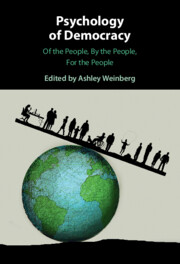Book contents
- Psychology of Democracy
- Psychology of Democracy
- Copyright page
- Contents
- Figures
- Tables
- Contributors
- Preface
- Acknowledgements
- Chapter 1 Psychology of Democracy
- Part I Of the People
- Part II By the People
- Chapter 8 Trust in Political Institutions and Support for Authoritarianism
- Chapter 9 New Technology, Language and Gesture in Contemporary Indian Political Discourse
- Chapter 10 Fact or Fiction
- Chapter 11 Dissecting the Psychology of a Voter
- Chapter 12 Building Trust through a Revolving Door of Leaders:
- Chapter 13 After the Party Is Over
- Part III For the People
- Index
- References
Chapter 11 - Dissecting the Psychology of a Voter
A Citizen-Centric Approach in Studying Electoral Experience and Behaviour
from Part II - By the People
Published online by Cambridge University Press: 24 February 2022
- Psychology of Democracy
- Psychology of Democracy
- Copyright page
- Contents
- Figures
- Tables
- Contributors
- Preface
- Acknowledgements
- Chapter 1 Psychology of Democracy
- Part I Of the People
- Part II By the People
- Chapter 8 Trust in Political Institutions and Support for Authoritarianism
- Chapter 9 New Technology, Language and Gesture in Contemporary Indian Political Discourse
- Chapter 10 Fact or Fiction
- Chapter 11 Dissecting the Psychology of a Voter
- Chapter 12 Building Trust through a Revolving Door of Leaders:
- Chapter 13 After the Party Is Over
- Part III For the People
- Index
- References
Summary
This chapter proposes a new angle in studying the psychology of democracy by embracing a citizen-centric approach through the prism of electoral psychology. Most existing studies in political science focus on voters’ electoral choices, aiming to understand why people support x or y, or indeed, why they vote at all. These questions focus paradoxically on what institutions need from elections, rather than on what they offer voters. I argue electoral choice is often not the most important factor of how an election is experienced by citizens and, instead, investigate how an election affects citizens’ lives, how it makes them and others feel and whether it provides a sense of democratic resolution. The implicit institutional perspective in electoral behaviour is present in existing research, but often is unacknowledged. This chapter identifies those assumptions, assessing some untold consequences and considering instead how the questions we ask and answer change once the assumptions are relaxed. This new electoral psychology approach heralds more nuanced behavioural insights by switching the dependent variables, revisiting existing theories and proposing new concepts. Exploring elements of electoral memory and the experience of the vote, I discuss whether elections can lead to resolution or instead accentuate divisions within society.
Keywords
- Type
- Chapter
- Information
- Psychology of DemocracyOf the People, By the People, For the People, pp. 250 - 264Publisher: Cambridge University PressPrint publication year: 2022

